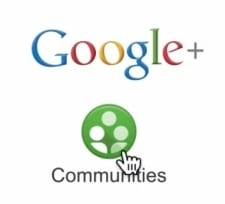 The recent rollout of Google+’s Communities looks a lot like Facebook’s own Groups. Have you noticed?
The recent rollout of Google+’s Communities looks a lot like Facebook’s own Groups. Have you noticed?
Inevitably it has led to people calling time on Facebook. Advocates of the new platform claim that we head to Google+ if we want our brands and communities to thrive.
The challenge with these comments is that they assume, wrongly in my view, that Facebook and Google are competing for the same territory and that their features, updates and users are after different flavours of the same thing.
It’s simply not the case.
Google+ Communities and Facebook Groups provide different things. Google wants to connect you to the things you are interested in, whereas Facebook helps connect you to the people you are interested in.
It’s not that either platforms can’t do both, but they prioritize things differently.
Facebook has always been a social place and a user’s place on their social graph is what underpins the platform. Google+, on the other hand, is a platform with its foundations firmly rooted in the interest graph.
It’s a place where your position is built on your relationship to things and your social connections, however personally important, are simply an additional layer added on top.
It’s this similarity to Forum communities which indicates where the new Google+ features are a real threat and is why I think we could easily see Google+ rise to become the default community platform in the years to come.
Communities are created through interaction and when it comes to humans, most of our interactions are initiated by shared or common interests.
Online and offline we see this all the time. All around us groups of strangers come together to create communities around shared interests. Whether linked by common geographies, technology, religion, science or culture.
If you search for your interests right now, you’ll find a community set up to cater for it and it’s these results, these existing forums, newsgroups and chatrooms on which Google+ Communities has set its sights.
The Google+ Community is aiming to disrupt the status quo where the top results for a quick search on your favourite subject will return a Forum or Blog alive with comments. It wants instead a world where these conversations are happening on, or are at least curated within, the Google+ platform.
Google’s new community pages come with a massive SEO advantage from the search giant and provide members with features way ahead of community management platforms such as vBulletin.
While it’s unlikely that there will be an exodus of members from established communities towards the Google+ community platform, I do think we’ll see a slow migration of the 1%, of content creators and thought leaders as “old school” administrators struggle to compete with the breath of features and content on offer on G+.
New communities when they spring up will more often than not spring up on Google instead of on forum software and slowly, over time it’ll be hard for any “owned” social property to survive without Google integration because of the diminished search traffic.
Facebook needn’t be worried by Google+ Communities. But Forums should.


